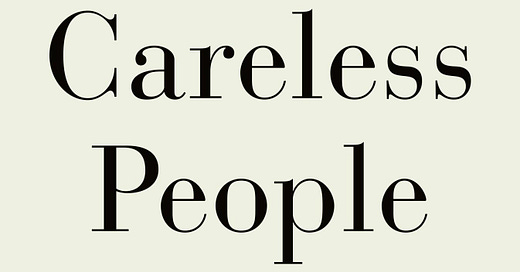An ethical collapse: How Facebook’s greed broke the world
Inside the power plays, ethical failures, and corporate negligence that fueled a digital reckoning
Careless People: A Cautionary Tale of Power, Greed, and Lost Idealism
By Sarah Wynn-Williams
“Facebook is an autocracy of one.”
It’s hard to imagine a more scathing indictment of a company, its culture, and its leadership than Sarah Wynn-Williams's book Careless People: A Cautionary Tale of Power, Greed, and Lost Idealism, which delivers a shocking insider's perspective on Facebook (now Meta) from 2011 to 2017. As the former director of global public policy, Wynn-Williams—through her access to the executive leadership, including CEO Mark Zuckerberg and then-COO Sheryl Sandberg—shares in great detail how the company's initial mission to connect people morphed into a relentless pursuit of profit, with devastating ethical consequences.
We’ve heard over the years, often from in-depth, heavily researched stories by reputable news outlets, how the company has been complicit in the rise of online hate speech, contributed to the mental health crisis among teens, and helped to sow political discord in the U.S. and abroad. Even against that backdrop, Careless People was still at times jaw dropping for its portrayal of reckless disregard by Facebook executives in taking responsibility for their actions—or, in many cases, inaction—as heads of one of the most prominent and most powerful companies on the planet.
Targeting vulnerable teens for profit
One of the most disturbing revelations is Facebook's calculated exploitation of emotionally vulnerable teenagers. Wynn-Williams discloses how the company tracked emotional cues from users aged 13 to 17, strategically serving ads to capitalize on their insecurities, highlighting a clear prioritization of profit over user well-being.
Fueling violence in Myanmar
The book also exposes Facebook's complicity in the violence against the Rohingya people in Myanmar. The platform's failure to effectively moderate content allowed hate speech to proliferate, contributing to a humanitarian crisis. Wynn-Williams argues that this negligence had direct, real-world consequences. (This section of the book was truly heart-breaking and exposed how out of touch and unconcerned Facebook’s leaders are with the power wielded by the brand.)
A glimpse inside the leadership circle
Wynn-Williams provides a candid portrayal of top executives, including Mark Zuckerberg and Sheryl Sandberg. She depicts Zuckerberg as increasingly driven by political ambitions, sometimes at the expense of ethical considerations. Sandberg, once lauded as a feminist icon, is shown fostering a high-pressure work environment and engaging in what Wynn-Williams characterizes as performative feminism.
Allegations of misconduct
The memoir also raises serious allegations against Sandberg, who is blamed for fostering a toxic work environment and engaging in personal misconduct. Perhaps the most salacious revelations of Sandberg’s personal conduct is Wynn-Williams’ recounting stories of extravagant shopping sprees on company time and an incident where Sandberg told an aide to “come to bed” while on a private jet.
Five takeaways
Facebook’s business model is built on manipulation. The company doesn’t just sell ads—it monetizes emotions. It tracks when teens feel vulnerable and feeds them ads tailored to their insecurities.
Social media isn’t just digital; it has real-world consequences.The Myanmar crisis wasn’t an outlier. Facebook still struggles to control hate speech and misinformation worldwide.
Your private data is a bargaining chip. Facebook was willing to hand over user data to China to expand its business.
Big Tech executives aren’t who they pretend to be. Sandberg used her feminist image to shield herself from criticism, while Zuckerberg prioritized influence over accountability.
Whistleblowers pay the price. Wynn-Williams left Silicon Valley to tell her story. She was fired after reporting her boss for sexual harassment. She called her dismissal a “quick euthanasia.”
Final thoughts
Maybe I’m biased since I hate social media for how it’s become so toxic and anti-social, but I think anyone would benefit from reading Careless People. The inside look it gives into one of the most most significant companies is disheartening.





I ordered this book. Interested to read it. When it’s all said and done, I think Mark Zuckerberg will go down as one of the worst people ever inflicted on the human race. His entire idea was launched on the premise of retaliation from being personally scorned. Then easily influenced by capital equity. It was destined to be rooted in evil at its core.